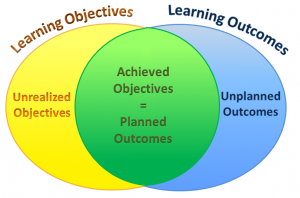- Viewing people as rational economic agents – analyzing motivations behind people’s actions in all settings focusing on economic drivers of behavior
- Agents strive to maximize their utility – acting from the assumption that everyone makes decisions for their own good / pleasure / utility, expecting people’s actions to line up with improvements in their personal utility
- To prove something, one needs to provide tangible quantitative evidence – looking to reliable data to verify assumptions and arguments, being sceptical of judgements based on anecdotal evidence and/or biased samples Continue reading
Monthly Archives: December 2016
Ideal & Real: Learning Objectives & Outcomes
Real-life teaching

Note to self: the personal goal of an instructor would then be to minimize the ‘yellow’ zone and ensure that if there are unplanned outcomes (the ‘blue’ zone), which are always going to occur, those are positively affecting the students’ learning.
Practicum (term 1): Theory through a Case Study
Teaching practicum report 1
Guest Lecture: Vancouver Housing Market – A Case of a Growth Machine (Nov. 29th, 2016)
(Course: Geog 250 Cities)
A good lecture is a like a good paper. It needs structure and the main idea, like a thesis statement. An idea that is to be communicated to the students that will be their main take-away. It is like the main learning objective. Their could be additional more specific LOs, but the main one needs to be clear and straightforward. Just like in any good presentation. And while most of my presentations are good presentations, I think, there is always room for improvement.
In my first practicum, a lecture on the Vancouver housing market for the 200-level Urban Geography course, I have been preparing different aspects as a part of the teaching program: working on specific learning objectives, thinking of engagement strategies, creating good slides. However… the basic narrative, the main idea, might have been lost as I was focusing on other more minor details. It is something I haven’t foreseen and wouldn’t have noticed had it not been for the comments from my mentor. Continue reading
